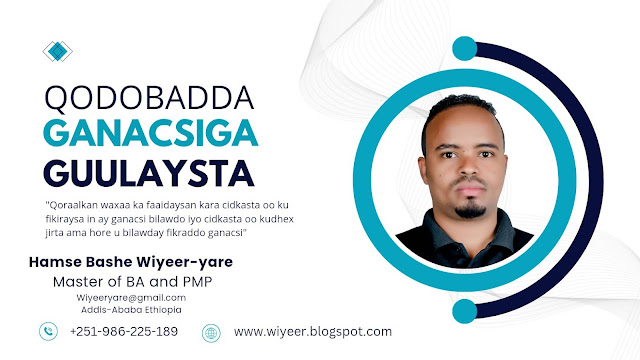Five Areas That Will Challenge The Newly Elected President of Somaliland
In the recent elections for the President of
Somaliland, it has been determined that Dr. Abdirahman Mohamed Abdilahi Cirro
will assume this prominent position. He is very significant for the democracy
as well as the politics of the region. He is a veteran politician and a
statesman who believes in the cause of modernism, and therefore his ascendance
to such an office can only be seen as an example of the people of Somaliland’s
commitment to the peaceful transfer of power.
A common trait in Dr. Cirro’s leadership roles
has been emphasis on togetherness, inclusivity, and being developmental
oriented towards the needs of Somaliland. His tenure is expected to tackle the
pressing issues of the day which include economic advancement, international
recognition and social change. Some of the expectations on his shoulders stem
from the fact that his election marks the beginning of a new history in
Somaliland, where he will be able to gain citizens’ trust to lead towards
national development and recognition expansion.
 |
| Dr.Abdirahman Mohamed Abdilahi Cirro, Somaliland's New President |
Somaliland fastened its newly elected president,
and unfortunately, the leader is confronted with numerous demands that may
profoundly affect the politics of this self-identified republic. Despite
existing outside international legal boundaries, Somaliland has successfully
projected itself as a relatively peaceful region within the Horn of Africa.
Nevertheless, the presidential office has its limitations which if not worked
on, progress will not be made and challenges will remain. These are five
challenges which the new president of Somaliland will have to tackle:
1. Gaining International
Acceptance
Somaliland has been independent since 1991 when
the Republic of Somalia collapsed, but unfortunately is yet to be declared a
country by the international community. Such situations lead to limitations in
seeking international help, signing trade deals or partnership agreements.
The new president will have to strategize on how
to mix diplomacy and advocacy when it comes to the powerful regional and global
countries that they want to help, given the resistance by the African Union,
United Nations, and her neighbors. It will also be important in the global
arena to develop deep bilateral relations and to make use of Somaliland's
history of peace and democracy.
2. Responding To the
Underlying Economic Problems
The economy of Somaliland is primarily dependent
on remittances from the diaspora and also on livestock export, particularly to
the gulf countries. Even with these, it is still at the mercy of external
factors like trade restrictions, drought conditions, and price volatility of
commodities.
The new administration, in its fight for
economic independence, must seek to improve the economic structure by venturing
into other areas such as infrastructure development, information communication
technology, and even commercial farming. This is also particularly important in
dealing with the social ills associated with high populations of the youth
which is unemployment and outflow of the country’s educated human resources.
3. Understanding the
Politics of Clan Systems
As noted previously, clans have been an integral
aspect of Somaliland’s politics. The existing clan power-sharing structure has
aided in maintaining peace but at times hinders decision making and appropriate
governance.
The president will also have to work hard in
these areas as promoting inclusiveness may antagonize some segments of the
society. This could also curtail the effects of clannism on politics in
Somaliland through the building of structures and institutionalization of issue
based politics.
4. Ensuring Security and
Control over Regional Factions
The region is dealing with multi-faceted
security risks posed by armed groups, border-related conflicts with Somalia,
and inter-communal clashes such as the one in Las’Anod. The societal
equilibrium is thus a matter of finding a right mix of how ready the forces get
into a conflict and how ready the forces are to engage in dialogue and
reconciliation.
The newly elected leader shall also be
responsible for the integrity of boundaries of Somaliland, which is a welcome
expectation as this also does not seek to provoke Somalia or any other
neighboring region. For sustainable peace, one must militarily build local
security while constructing local institutions to deal with issues that create
the anger.
5. Addressing Corrupt
Practices and Improving Governance
The threat of corruption and poor governance is
poised to sap the confidence of the citizens of Somaliland as well as hinder
the economic growth of the territory. The fresh president of the country should
ensure that efficiency with the use of resources is guaranteed through the
implementation of transparency and accountability policies as well as measures
against corruption.
Changes in public sector institutions, the
transition of processes to an e-government platform, and the strengthening of
pressure on functionaries by the public may restore confidence in the system.
There will be no point talking about infrastructure, health, education
improvement without fighting corruption.
Finally:
The new president of Somaliland has many
opportunities and challenges at hand. Though the relative stability of the
country provides a strong backbone, solving these issues will take great
leadership, inclusive policies and good governance.
The path towards acceptance, economic
advancement and peace will not be smooth, but with focused resolve, the
president can turn the tides in favor of Somaliland and its citizens.
Author
Wiyeer
Hargeisa




Comments
Post a Comment